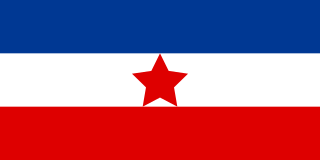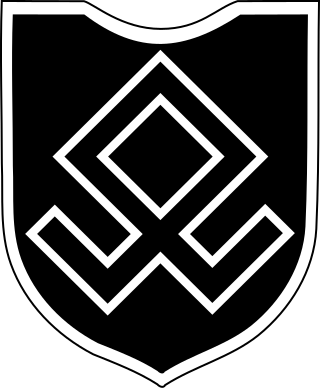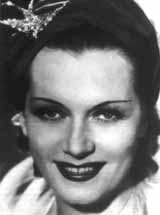
In Nazi German terminology, Volksdeutsche were "people whose language and culture had German origins but who did not hold German citizenship." The term is the nominalised plural of volksdeutsch, with Volksdeutsche denoting a singular female, and Volksdeutscher, a singular male. The words Volk and völkisch conveyed the meanings of "folk".

Underground, is a 1995 epic satirical black comedy war film directed by Emir Kusturica, with a screenplay co-written with Dušan Kovačević. It is also known by the subtitle Once Upon a Time There Was One Country, the title of the five-hour miniseries shown on Serbian RTS television.

Ante Pavelić was a Croatian politician who founded and headed the fascist ultranationalist organization known as the Ustaše in 1929 and was dictator of the Independent State of Croatia (NDH), a fascist puppet state built out of parts of occupied Yugoslavia by the authorities of Nazi Germany and Fascist Italy, from 1941 to 1945. Pavelić and the Ustaše persecuted many racial minorities and political opponents in the NDH during the war, including Serbs, Jews, Romani, and anti-fascists, becoming one of the key figures of the genocide of Serbs, the Porajmos and the Holocaust in the NDH.

Vjekoslav Luburić was a Croatian Ustaše official who headed the system of concentration camps in the Independent State of Croatia (NDH) during much of World War II. Luburić also personally oversaw and spearheaded the contemporaneous genocides of Serbs, Jews and Roma in the NDH.

The Yugoslav Partisans, or the National Liberation Army, officially the National Liberation Army and Partisan Detachments of Yugoslavia, was the communist-led anti-fascist resistance to the Axis powers in occupied Yugoslavia during World War II. Led by Josip Broz Tito, the Partisans are considered to be Europe's most effective anti-Axis resistance movement during World War II.

The 7th SS Volunteer Mountain Division "Prinz Eugen", initially named the SS-Volunteer Division Prinz Eugen, was a mountain infantry division of the Waffen-SS, an armed branch of the German Nazi Party that served alongside but was never formally part of the Wehrmacht during World War II. At the post-war Nuremberg trials, the Waffen-SS was declared to be a criminal organisation due to its major involvement in war crimes and crimes against humanity. From 1942 to 1945, the division fought a counter-insurgency campaign against communist-led Yugoslav Partisan resistance forces in occupied Yugoslavia. It was formed in 1941 from both Reich Germans and Volksdeutsche – ethnic German volunteers and conscripts from the Banat, Independent State of Croatia, Hungary and Romania. The division surrendered on 11 May 1945 to Yugoslav Partisan forces, with thousands of stragglers surrendering by the 15th near the Austrian border.

Olga Konstantinovna Chekhova, known in Germany as Olga Tschechowa, was a Russian-German actress. Her film roles include the female lead in Alfred Hitchcock's Mary (1931).

Dimitrije Ljotić was a Serbian and Yugoslav fascist politician and ideologue who established the Yugoslav National Movement (Zbor) in 1935 and collaborated with German occupational authorities in the Territory of the Military Commander in Serbia during World War II.

Untermensch is a German language word literally meaning 'underman', 'sub-man', or 'subhuman', which was extensively used by Germany's Nazi Party to refer to non-Aryan people they deemed as inferior. It was mainly used against "the masses from the East", that is Jews, Roma, and Slavs.

Crveni Krst, also known as the Niš concentration camp, was a concentration camp operated by the German Gestapo located in the Crveni Krst municipality of Niš, in German-occupied Serbia. It was used to hold captured Serbs, Jews, Roma and anti-fascists during World War II. Established in October 1941, between 30,000 and 35,000 people were detained within it during the war. It was liberated by the Yugoslav Partisans in 1944. More than 10,000 people are thought to have been killed in the camp over the course of its existence.

The Genocide of Serbs in the Independent State of Croatia was the systematic persecution and extermination of Serbs committed during World War II by the fascist Ustaše regime in the Nazi German puppet state known as the Independent State of Croatia between 1941 and 1945. It was carried out through executions in death camps, as well as through mass murder, ethnic cleansing, deportations, forced conversions, and war rape. This genocide was simultaneously carried out with the Holocaust in the NDH as well as the genocide of Roma, by combining Nazi racial policies with the ultimate goal of creating an ethnically pure Greater Croatia.
Homecoming is a 1941 Nazi German anti-Polish propaganda film directed by Gustav Ucicky. Filled with heavy-handed caricature, it justifies extermination of Poles with a depiction of relentless persecution of ethnic Germans, who escape death only because of the German invasion.

Anti-Serb sentiment or Serbophobia is a generally negative view of Serbs as an ethnic group. Historically it has been a basis for the persecution of ethnic Serbs.
Wunschkonzert is a 1940 German drama propaganda film by Eduard von Borsody. After Die große Liebe, it was the most popular film of wartime Germany, reaching the second highest gross.

The Holocaust in the Independent State of Croatia involved the genocide of Jews, Serbs and Romani within the Independent State of Croatia, a fascist puppet state that existed during World War II, led by the Ustaše regime, which ruled an occupied area of Yugoslavia including most of the territory of modern-day Croatia, the whole of modern-day Bosnia and Herzegovina and the eastern part of Syrmia (Serbia). Of the 39,000 Jews who lived in the NDH in 1941, the United States Holocaust Memorial Museum states that more than 30,000 were murdered. Of these, 6,200 were shipped to Nazi Germany and the rest of them were murdered in the NDH, the vast majority in Ustaše-run concentration camps, such as Jasenovac. The Ustaše were the only quisling forces in Yugoslavia who operated their own extermination camps for the purpose of murdering Jews and members of other ethnic groups.

The Blessed Martyrs of Drina are the professed Sisters of the Congregation of the Daughters of Divine Charity, who died during World War II. Four were killed when they jumped out of a window in Goražde on 15 December 1941, reportedly to avoid being raped by Chetniks, and the last was killed by the Chetniks in Sjetlina the following week. The five nuns were later declared martyrs and beatified by Pope Benedict XVI on 24 September 2011.

Hannelore Emilie Käte Grete Schroth was a German film, stage, and television actress whose career spanned over five decades.
The Gudovac massacre was the mass killing of around 190 Bjelovar Serbs by the Croatian nationalist Ustaše movement on 28 April 1941, during World War II. The massacre occurred shortly after the German-led Axis invasion of Yugoslavia and the establishment of the Ustaše-led Axis puppet state known as the Independent State of Croatia (NDH). It was the first act of mass murder committed by the Ustaše upon coming to power, and presaged a wider Ustaše-perpetrated campaign of genocide against Serbs in the NDH that lasted until the end of the war.

Dara of Jasenovac is a 2021 Serbian historical drama film directed by Predrag Antonijević. Based on the testimonies of survivors, it deals with war crimes and atrocities that took place at Jasenovac concentration camp, which was a part of the Holocaust and the wider genocide of Serbs in the Independent State of Croatia.
Anarchism in Bosnia and Herzegovina first emerged from left-wing currents of the anti-imperialist movement, gaining traction as a tendency in the revolutionary organization Young Bosnia. Following assassination of Archduke Franz Ferdinand and World War I, Bosnia and Herzegovina was brought under a series of authoritarian regimes, before gaining independence in 1992. In the post-independence climate of rising nationalism and income inequality, anarchism re-emerged as part of the nascent anti-nationalist and anti-capitalist movements of the 21st century.















